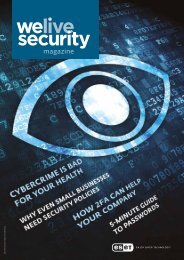magazine
You also want an ePaper? Increase the reach of your titles
YUMPU automatically turns print PDFs into web optimized ePapers that Google loves.
CYBERCRIME IS BAD FOR YOUR HEALTH<br />
TIPS FOR<br />
protecting your<br />
medical data<br />
By Lysa Myers, Security<br />
Researcher, ESET<br />
Do not share personal details<br />
unless you absolutely have to<br />
A lot of fraud happens because<br />
people give their login or insurance<br />
information to friends or family<br />
members. If someone gets medicines<br />
under your name, it will be listed for<br />
you and may mean you get improper<br />
medical care. Or you could end up<br />
having to pay someone else’s bills.<br />
Check your statements<br />
Be sure to read thoroughly and<br />
understand the charges that come<br />
in your statements from doctors’ offices<br />
and insurance companies. If you do not<br />
understand what you see, or if you see<br />
something listed that you do not recall<br />
having been done or given to you, call<br />
back and get an explanation.<br />
Check your apps and health data<br />
If you use an app to track health data,<br />
it’s a good idea to see how well it<br />
safeguards your information. Reviews<br />
online and at the app store where you<br />
bought it are a good place to start.<br />
Check the permissions for the app to<br />
see what other information it may be<br />
accessing. You can encrypt data on your<br />
mobile device for extra protection.<br />
Advocate for security and privacy<br />
If you feel comfortable discussing<br />
security measures and privacy controls,<br />
ask your health providers what<br />
measures they have in place to protect<br />
your data. You might be surprised at<br />
the answer – and not always for the<br />
worse. Many healthcare practitioners<br />
I’ve spoken with have well thought-out<br />
security in their environments.<br />
REGARDING SECURITY AND PRIVACY<br />
OF ELECTRONIC PATIENT DATA<br />
40%<br />
are concerned<br />
about the security<br />
and privacy of their<br />
electronic patient<br />
health records.<br />
17%<br />
say this is not<br />
applicable to them;<br />
their health records are<br />
not in electronic format.<br />
REGARDING DIGITIZING ALL<br />
PATIENT HEALTH RECORDS<br />
59%<br />
would support<br />
the move toward<br />
digitizing all patient<br />
health records in<br />
the US.<br />
HEALTH PRIVACY: ARE WE WORRIED YET?<br />
40%<br />
Two-in-five (40%)<br />
Americans familiar with<br />
the NSA revelations are<br />
concerned about the<br />
security and privacy of<br />
their electronic patient<br />
health records.<br />
43%<br />
are not concerned<br />
about the security<br />
and privacy of their<br />
electronic patient<br />
health records.<br />
41%<br />
would not support<br />
the digitizing of<br />
all patient health<br />
records in the US.<br />
43% of Americans familiar with the NSA<br />
revelations are not concerned about the security<br />
and privacy of their electronic patient records.<br />
Those aged 35+ (46%) are more likely than those<br />
aged 18-34 (36%) to not be concerned about this.<br />
And those with a household income of $75k or<br />
higher (48%) are more likely to say this.<br />
17% of Americans familiar with the NSA<br />
revelations say that to their knowledge, their<br />
health records are not in electronic format.<br />
Interestingly, those aged 18-34 (27%) are twice as<br />
likely than those aged 35+ (13%) to believe their<br />
health records are not in electronic format.<br />
Source and survey methodology: The survey was conducted online within the United States by Harris Poll on<br />
behalf of ESET from February 4-6, 2014 among 2,034 U.S. adults aged 18 and older, among which 1,691 are at least<br />
somewhat familiar with the NSA revelations.<br />
welivesecurity.com 11



